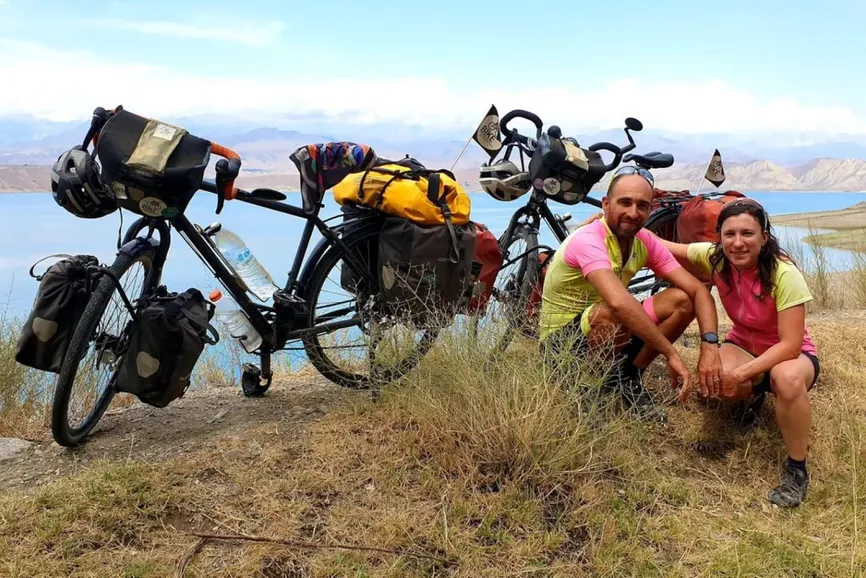In June, we wrote about a French cycling couple who are leading a project in support of children with Down syndrome. Émilie and Davy Sanchis visited Aktau as part of their Bike Up and Down cycling tour. In their blog, they documented their trip across the Mangistau region but did not have a chance to visit many organizations aiming to promote inclusiveness in Kazakhstan. They moved forward to explore the rest of Central Asia, and got more coverage by local media. Their first visit to Kazakhstan was mostly written off as a cycling marathon by foreigners in awe of Kazakh nature.
This is why the couple’s visit to Almaty last week was particularly important, as Émilie and Davy have had a busy week promoting their project and taking part in workshops for the good cause. QazMonitor asked the Sanchis couple about their journey and where Kazakhstan is at in terms of assisting children with special needs.
What organizations have you cooperated with in Kazakhstan?
In Aktau (in May 2022), we presented the project to Yessenov University and Nazarbayev School to raise awareness around Down Syndrome and mental disabilities. But we didn’t find any institutions on this subject.
In Almaty, we visited Caritas Down Center with Father Guido Trezzani (we stayed two nights there). They work with Italian specialists to train Kazakh team and develop individual programs for the children. This center does a lot of things and add to the programs for children, they try to develop autonomy & inclusion for adults. For example, they managed to get Air Astana to hire Nikolay, a man with Down Syndrome. And normally, they will hire a woman with Down Syndrome because they realize it's a success.
Another place was the inclusive school "Insights" with Saltanat Murzalinova-Yakovleva, president of the Public Fund "Social Inclusive Programs Center". Class sizes are small with around 15 students maximum. Very important for inclusion, but they lack specialists. Neighbors sometimes tell to the teachers that children "like that" shouldn’t be here but locked up in an institution...
We also visited Pro Barista Academy where some people with mental disabilities are trained to become baristas.
The problem after is to find some companies who agree to hire people with mental disabilities. They would like to open an inclusive cafe, but need sustainable business models. We have to give them some contacts in Europe.
We participated in a 2-hour training session (warm-up, bowe, martial arts) for children and teenagers at the Jas Jayynger health and sports center and participated in its inauguration.
Any other venues in Kazakhstan you’d like to give a shoutout to?
We presented the project in "Alliance Française", Public School 25, and Institut Sorbonne-Kazakhstan to raise awareness.
We were also invited to visit RUH Family House [ part of «За стеной» project]. We didn't have time, but we think it's very interesting. They don't consider people with disabilities as [those who need to be] assisted but [those who are] able to be autonomous and employable like everyone else.
You have traveled all across Central Asia. Have you noticed anything in common regarding the attitude to intellectual and physical disabilities in those countries? Is there anything specific to Kazakhstan?
In Central Asia, disability is a taboo subject: many people think that you've got children with a disability because you're a bad person and God punished you... Or think disability is contagious, or that you have to lock these people up in institutions (like during the Soviet period). They don't know disabilities, they are afraid, or have wrong information... The mentalities have to change step by step to improve inclusion [which is only starting to take place].
What do you think needs to be improved in our country to make the daily life of people with Down syndrome more comfortable?
We think, first, the mentalities because there are still many abandonments or hidden children... And also, have good studies and trainings for doctors, paramedical professionals, and teachers ...
Many times, we have seen parents who [have] a child with Down Syndrome or another mental disability who work in centers with children but they don't have the [necessary training.]
This is your second visit to Kazakhstan as part of the Bike Up&Down project. What did you like (or dislike) about our country?
We like nature, you have so beautiful places like [the] Ustyurt plateau, for example. You have canyons as beautiful as [the ones] in the USA, but they are not known. And we love the hospitality. We dislike the wind!
Bike up & Down project is supported by Trisomie 21 France and its international counterpart Down Syndrome International. Through a bicycle trip from Blois, France to Nouméa, Émilie and Davy wish to promote inclusion of people with Down Syndrome and other intellectual disabilities through sport.
Since June 2021, they have already crossed France, Germany, Austria, Slovakia, Hungary, Romania, Moldova, Ukraine, Türkiye, Georgia, Azerbaijan, Kazakhstan, Tajikistan, Uzbekistan, and the Kyrgyz Republic.
